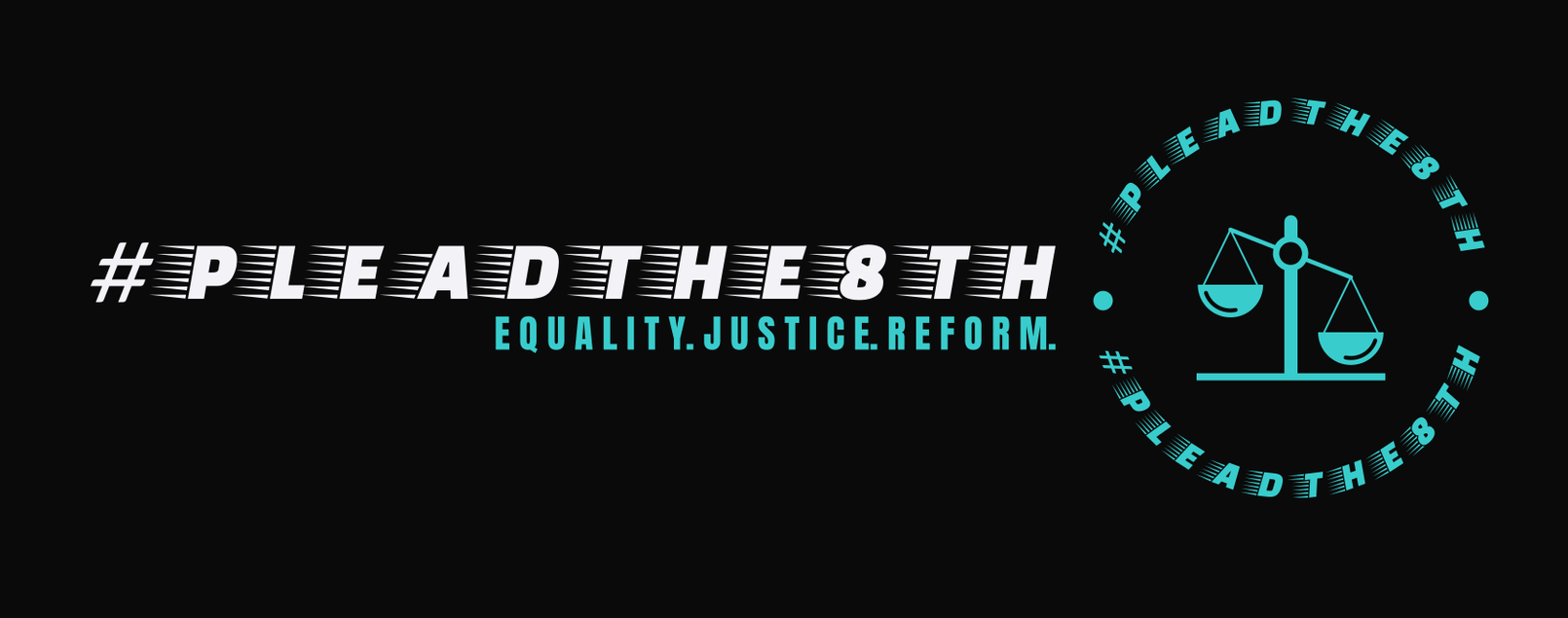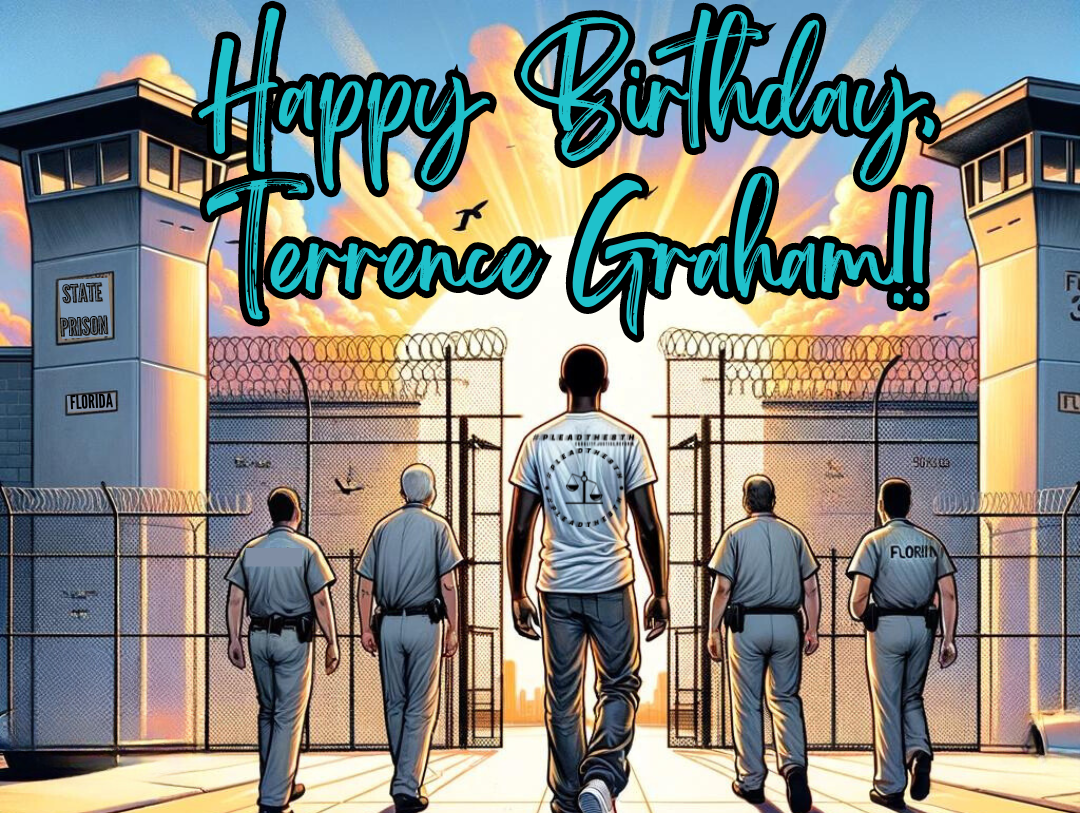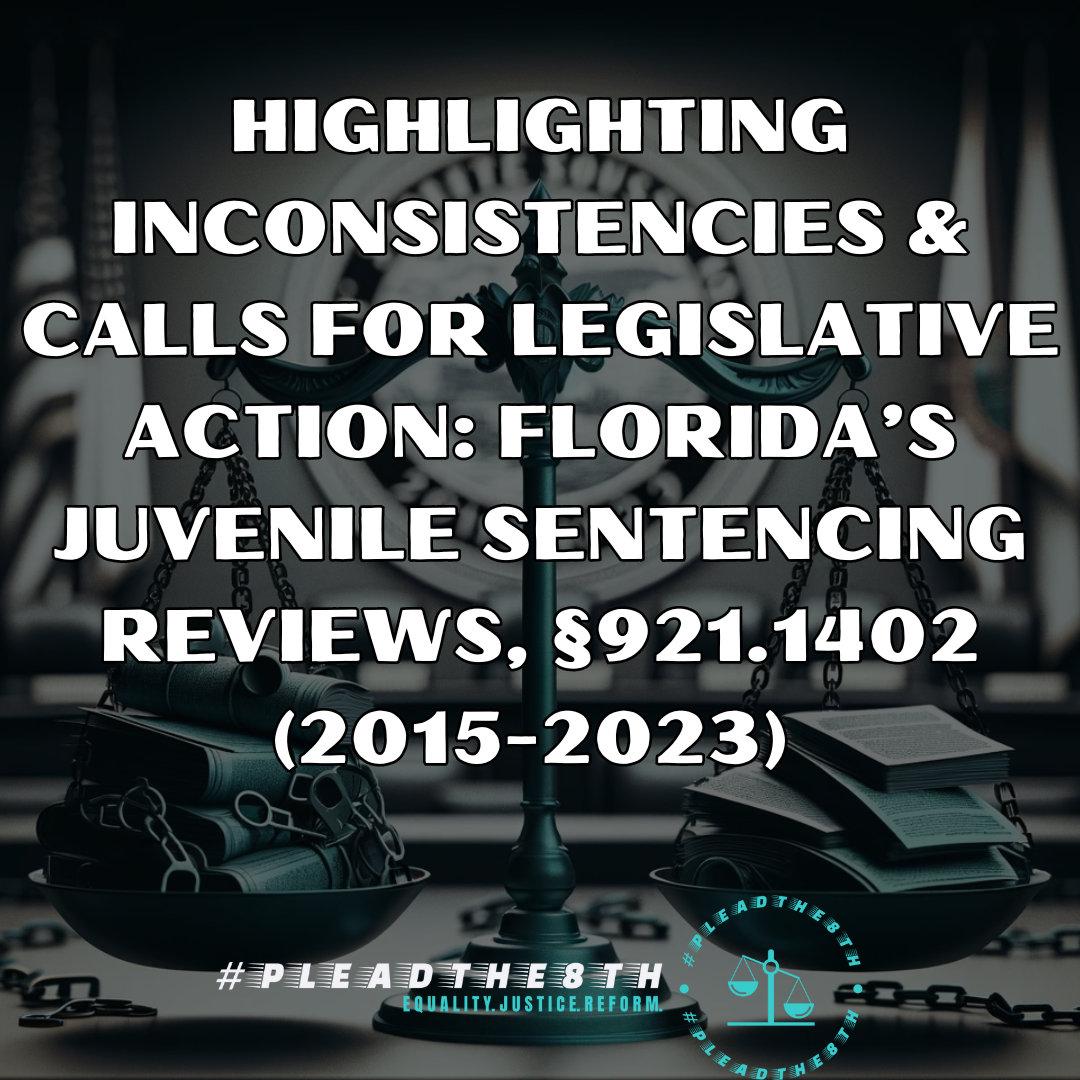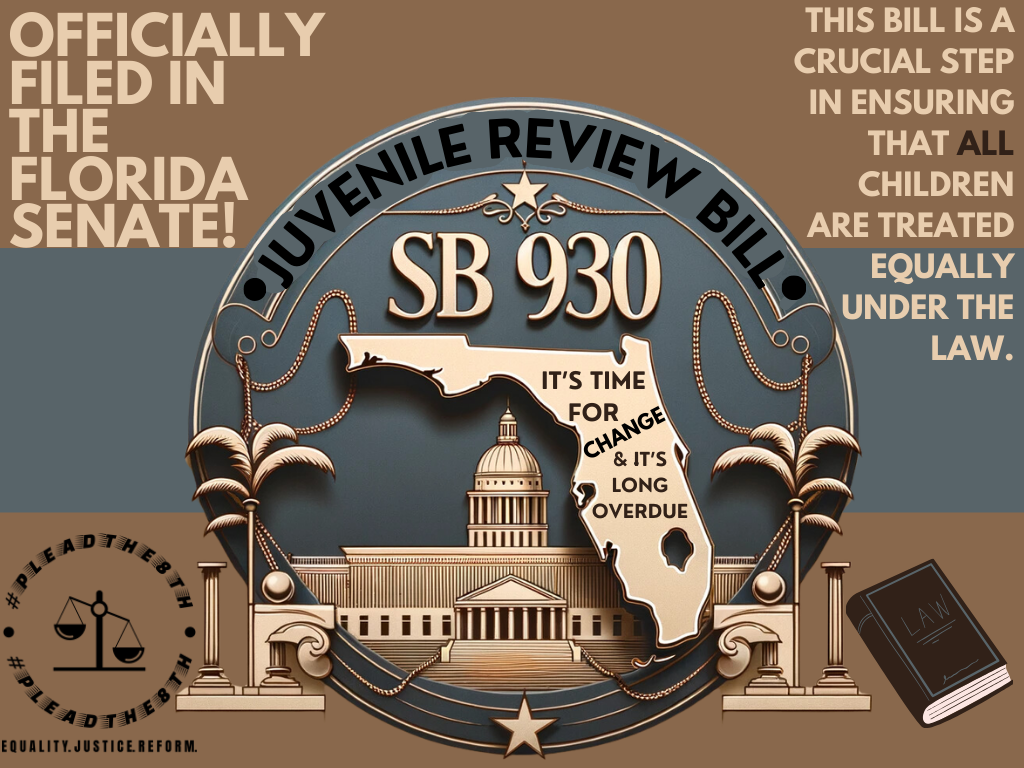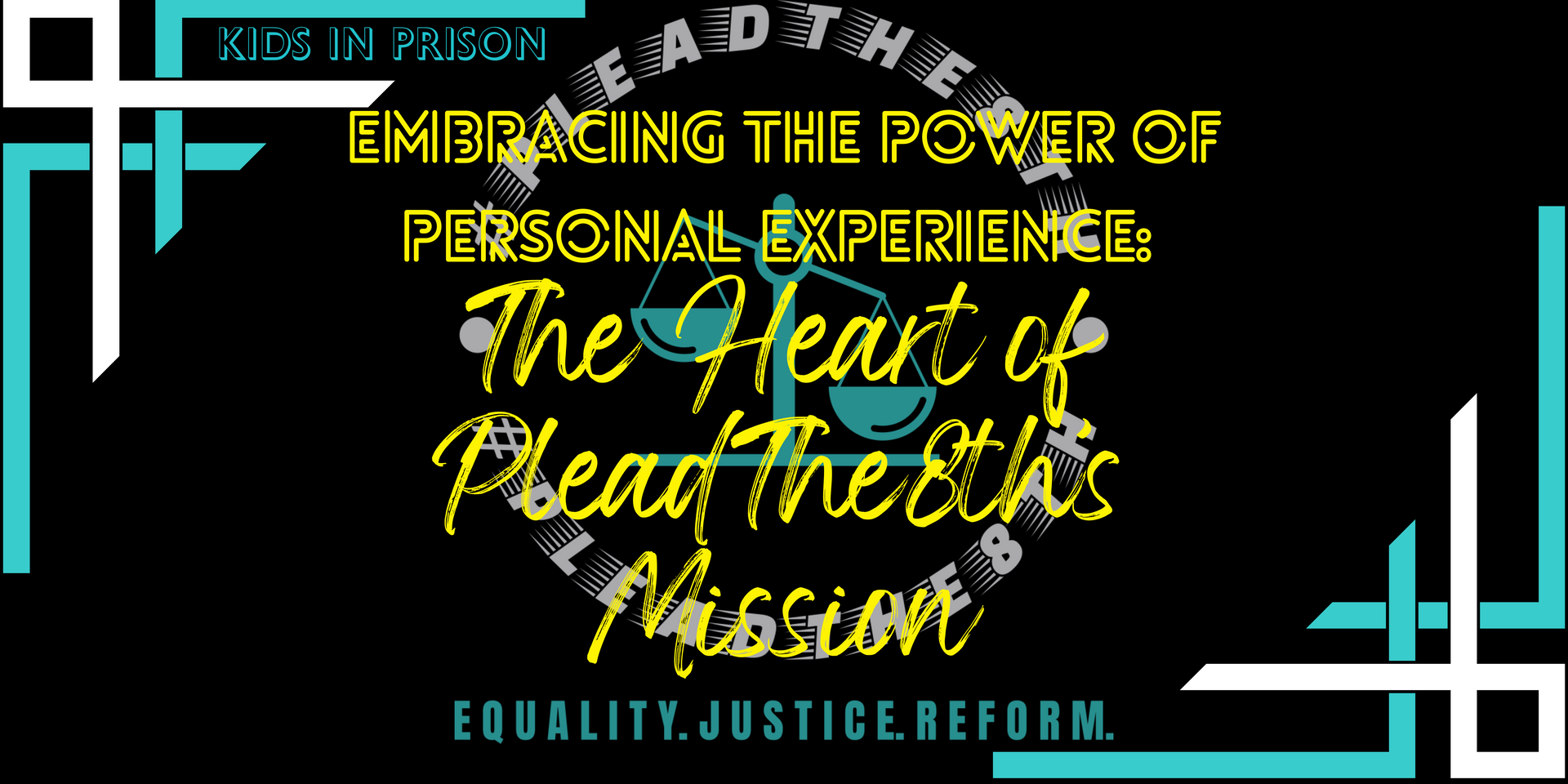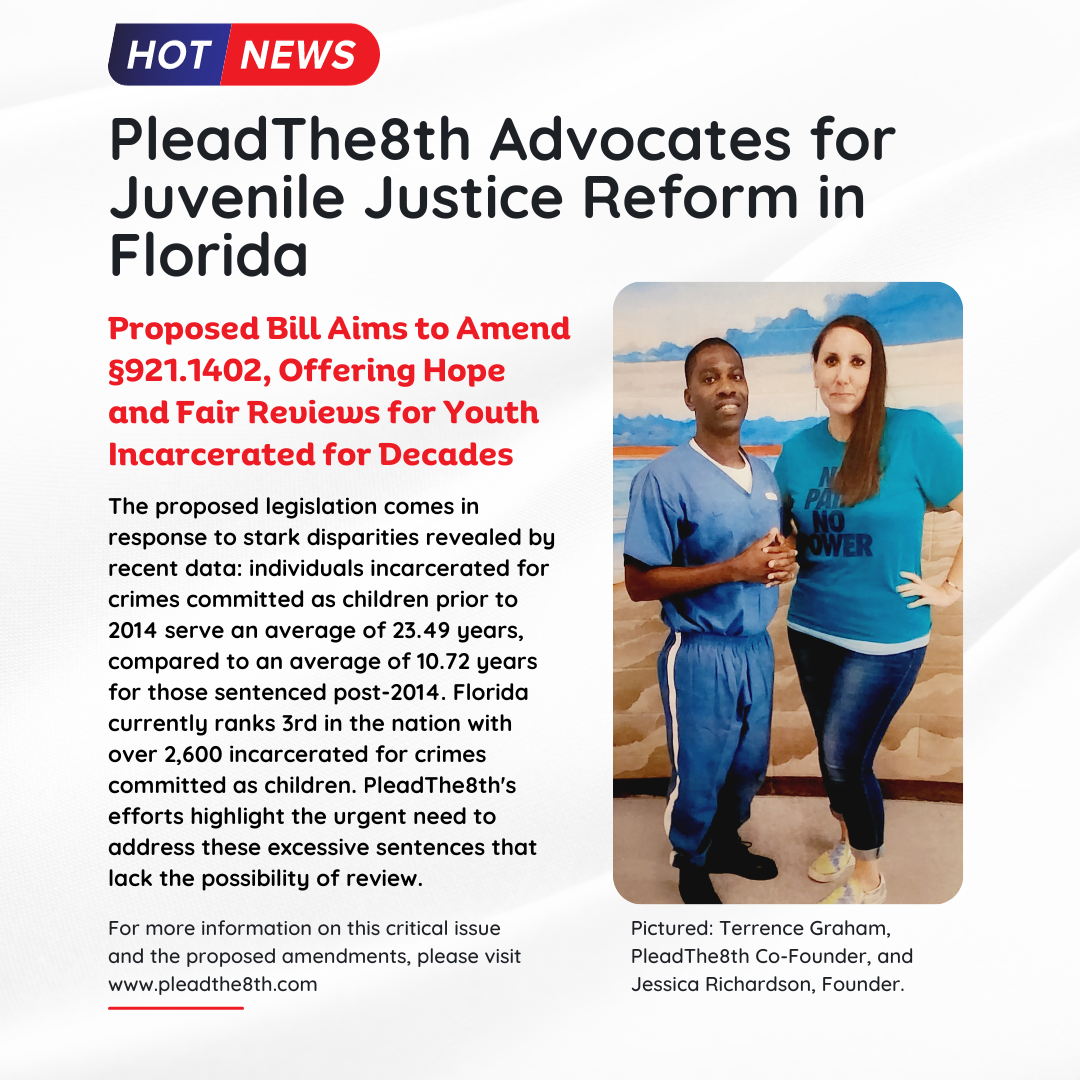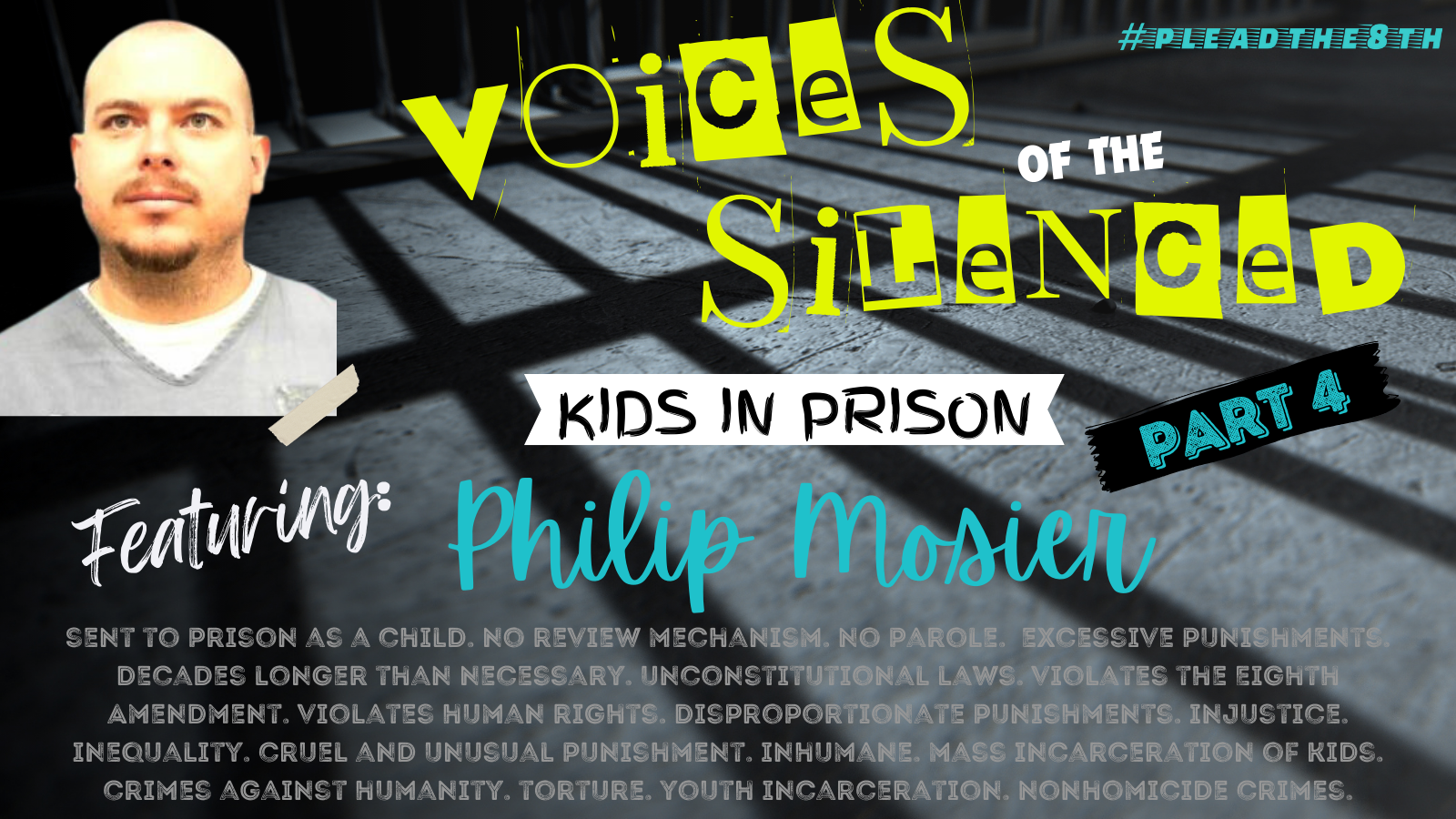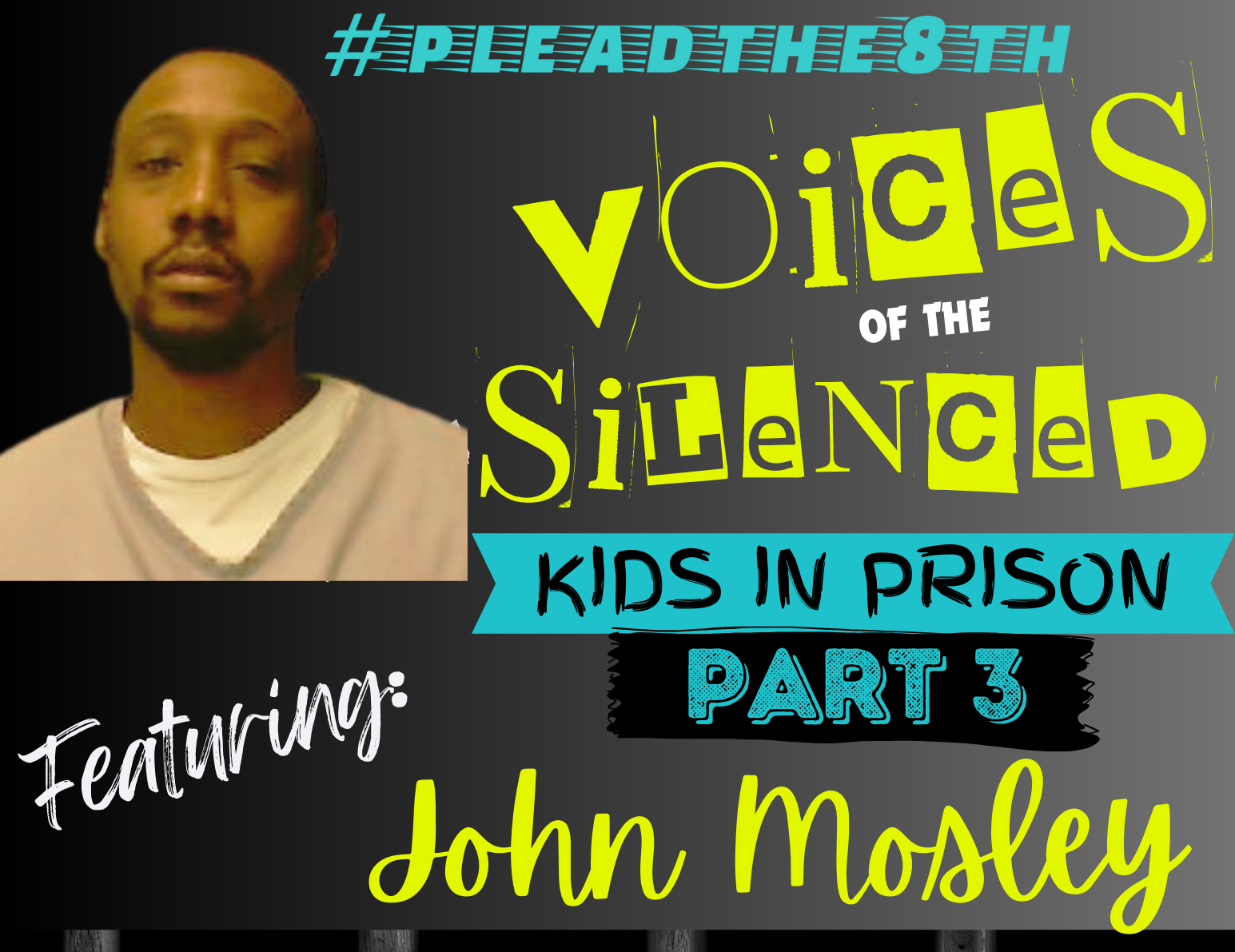It's Time to Wake Up, Floridians:
Kids At Risk of 15 Years in Prison for Phones and Coins with Current Bills HB1181/SB1274
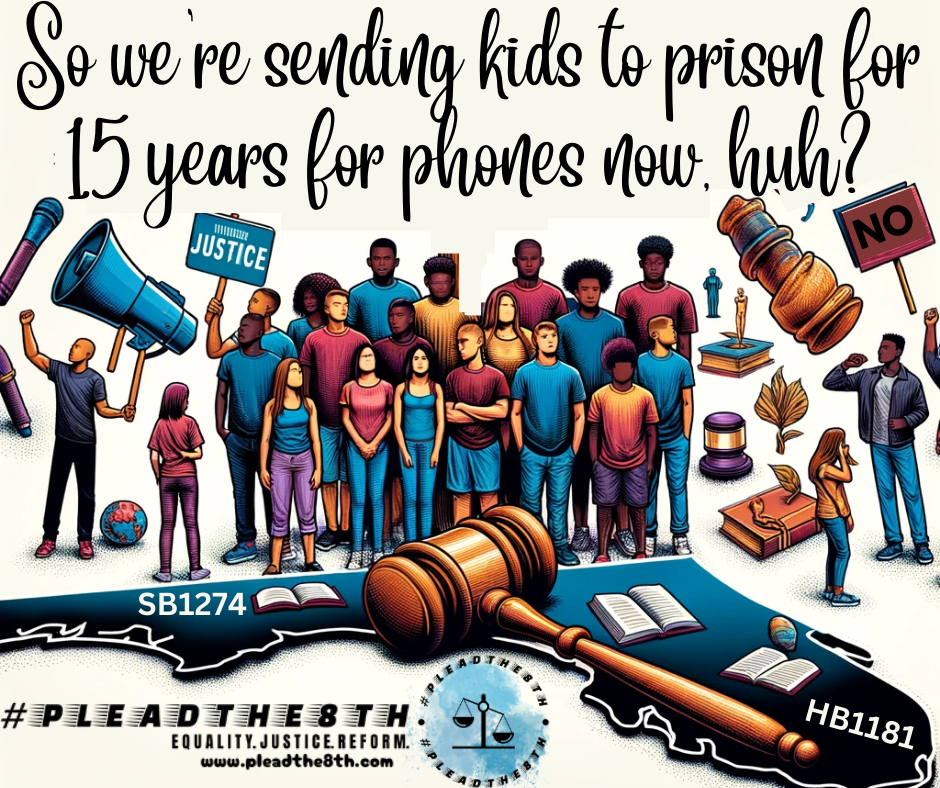
Demanding Transparency:
The Unspoken Consequences of Florida's Juvenile Gun Legislation HB1181/SB1274
The recent legislative move in the Florida Legislature, particularly with House Bill 1181 and Senate Bill 1274, which propose to reclassify youth firearm possession from a misdemeanor to a felony, raises severe concerns about our prosecutors' and lawmakers' underlying intentions.
Given the data and Florida's judicial system framework, it's hard to believe that the prosecutors who introduced these bills are unaware of its potential consequences. This skepticism isn't baseless but is rooted in an understanding of how the justice system operates, especially regarding the direct file of juveniles. This bill could have far-reaching implications, particularly for marginalized communities, since black and brown children already constitute a significant portion of direct files and incarcerations in the state.
In addition to these concerns, the proposed legislation's handling of contraband within juvenile facilities—where mere possession of everyday items like cell phones and coins could lead to severe felony charges—further exacerbates the potential for unjust treatment. This aspect, alarmingly underdiscussed, stands to disproportionately impact already marginalized youth, escalating the stakes of an already critical debate on justice reform in Florida.
🚩Why hasn’t there been more comprehensive discussions among lawmakers and in meetings about the significant implications of this bill?
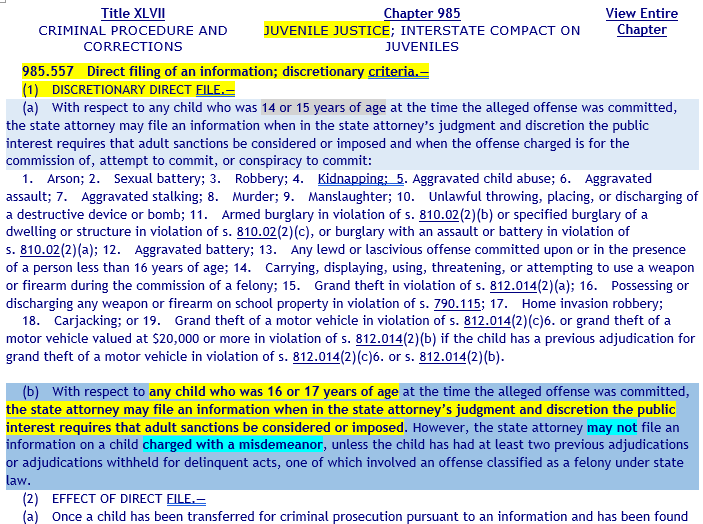
↪Direct File
🚩Florida's direct file statute, which allows for the transfer of juveniles to adult court, has been a long-standing issue of contention.
- Florida leads the U.S. in prosecuting children as adults, while Florida prosecutors choose to transfer children to adult courts.
- State law allows prosecutors to charge 14- and 15-year-olds in adult court for any one of 21 specified felonies, and 16- and 17- year-olds for any felony at all.
- The prosecutor's decision to send a child to adult court via direct file is not subject to judicial review and cannot be appealed.
- Direct-file cases against Florida youth declined in number to just under 800 in the 2020-21 fiscal year from roughly 12,000 in 2008-09, but the percentage of Florida juveniles who were tried as adults increased from 3.2% in 2019-20 to 3.7% in 2020-21.
- In 2016, Florida direct filed more children than California, Texas, Pennsylvania, North Carolina, and Michigan combined.
Direct filing is the prosecutor's decision in Florida, so wouldn't a prosecutor be well aware of the implications of changing this law from a misdemeanor to a felony? 🤔
The proposed bill's escalation to felonies for first-time offenses could likely increase these numbers, disproportionately affecting black and brown children. This is especially concerning given the existing racial disparities in juvenile prosecutions and incarcerations in the state.
- In 2018, 76.5% of cases transferred to adult court, the child was black or Latinx and children of color made up 65.8% of juvenile arrests statewide.
- Florida holds the number three spot nationally in the number of individuals currently incarcerated since childhood, with over 2,600, 74% of whom are of color.
- Racial disparities in sentencing are also significant, with those of color receiving up to 60% longer sentences than Whites for the same crime and scoresheet totals.

The direct file system has been criticized for perpetuating crime by sending juveniles to adult prisons and burdening them with criminal records that hamper their future. Proponents of the system, citing public safety concerns, support a tough stance on juvenile offenders. This perspective, however, overlooks the potential for rehabilitation, the societal cost of incarcerating young people for extended periods, and systemic inequities.
The bill, sponsored and defended by Rep. Berny Jacques on grounds of public safety and juvenile accountability, raises questions about his understanding of the issue. He asserts that
“Florida has sufficient deterrence, prevention, and diversion programs,” a claim that seems misinformed or willfully ignorant when compared with other states' services and programming for vulnerable youth.
Improved, yes. Sufficient, no.❌

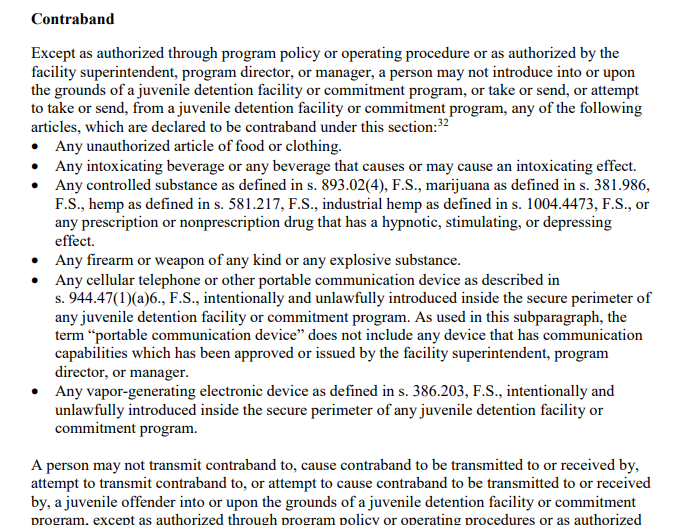
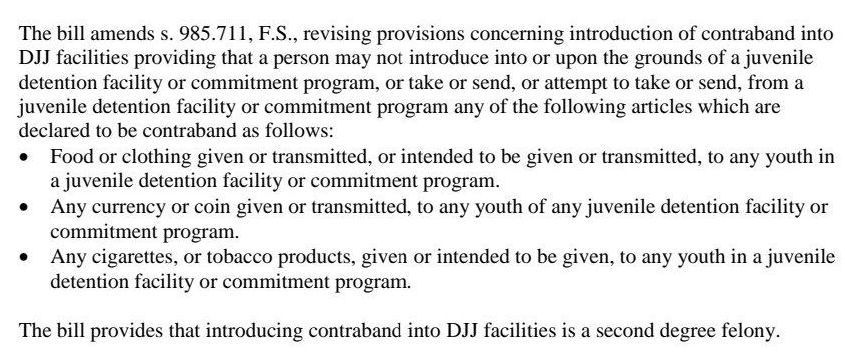
So, we're sending kids to prison for 15 years for phones now, huh? 🧐
🚩The bill's contraband section exacerbates these issues. 🚩
It proposes that introducing items like a cell phone, unauthorized clothing, or even a coin into a Department of Juvenile Justice facility could result in a second-degree felony charge, punishable by up to 15 years in prison. This is both unreasonable and unjust, considering these are minor infractions involving everyday items. Such punitive measures are misaligned with rehabilitation principles and fairness, reinforcing a pipeline disproportionately affecting minority communities and exacerbating racial disparities in the justice system.
Do the people of Florida want children to be sent to prison for 15 years for a coin, cell phone, or unauthorized clothing???🤔
Senator Martin's assertion in the Criminal Justice Committee meeting that the goal is to rehabilitate youth rings hollow in this context. How can rehabilitation be the objective when the system quickly funnels children into adult court and subjects them to harsh prison sentences? This approach ignores the root causes of juvenile delinquency, such as poverty, mental health issues, and substance abuse.
Rehabilitation is the goal. Oh, Ok. 🤔
You could have fooled us! 🧐
- Considering Florida has led the country in the number of youths direct filed to adult court for longer than a decade contradicts such statement.
- Considering Florida has
over 1,000
incarcerated since childhood that
aren't even given the opportunity to show rehabilitation and maturity due to an inequitable and unconstitutional law, also contradicts such statement.
The data tells a different story. 💯
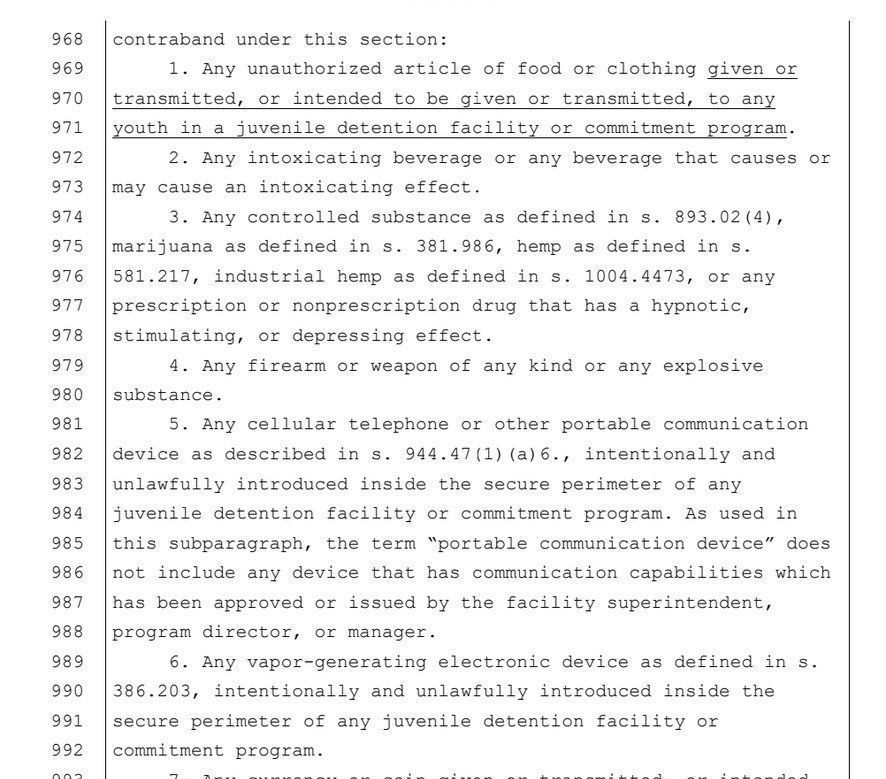
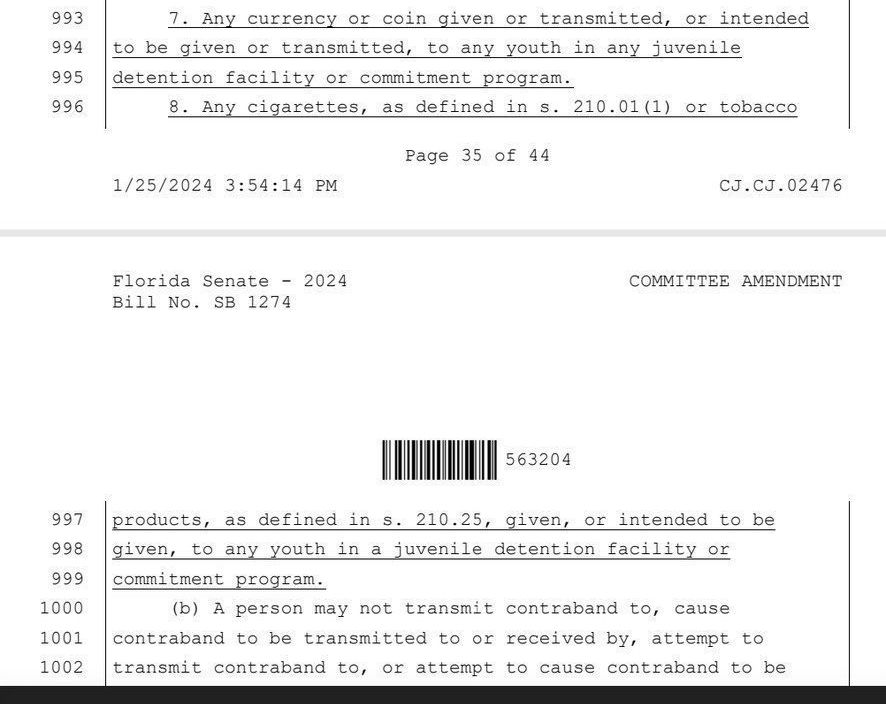
CLAIMS OF "PROTECTING CHILDREN"
The frustration grows as numerous lawmakers vocally advocate for 'protecting children,' yet this advocacy appears selective and not uniformly applied, especially concerning black and brown children. Lawmakers' claims of child protection seem insincere when juxtaposed with policies that disproportionately impact minority youth and favor incarceration over rehabilitation.
Say what? 🧐
Moreover, there's a contradiction in the legislative agenda that seeks to enhance penalties for juveniles with guns on one hand, while on the other, considers lowering the age for gun ownership.
- Day 1: 'Let's enhance penalties and send kids under 18 to prison for possession of a gun.' (HB1181/SB1274)
- Day 2: 'Let's lower the age to get a gun from 21 to 18.' (HB1223)
This undermines scientific data and United States Supreme Court rulings acknowledging that the human brain doesn't fully develop until around the age of 24.
Are these people serious? 🤯
True protection of children means ensuring the well-being of all children, irrespective of their race or background. This includes addressing the root causes of issues faced by juveniles and providing equitable support and resources, rather than resorting to incarceration as the default solution. The goal should be to create laws that are informed, fair, and in the best interest of all children. Until then, their claims of protecting children ring hollow to those who see the disparities and contradictions in the current approach.
"Protecting children," blah, blah, blah...
Fixation on Enhancements
Instead of passing laws that disproportionately impact minority youth, Florida's legislature should focus on addressing the root causes of juvenile delinquency and investing in community-based interventions. Let’s invest more in mental health services, substance abuse treatment, and poverty alleviation, rather than in a system that seems more intent on incarceration than on rehabilitation. It’s time for a paradigm shift in how we approach juvenile justice – one that recognizes the potential for reform and growth in our young people, rather than condemning them to a life defined by their earliest mistakes.
Despite this, bill after bill focuses on enhancing penalties, with no significant measures to alleviate factors contributing to increased prison populations. Critical bills like
SB930
and
HB1041, addressing the unjust incarceration of about 1,000 children under an inequitable and unconstitutional law are overlooked and fall of deaf ears.
A decade of judicial appeals for legislative action to correct these injustices, affecting a relatively small number of individuals compared to Florida's vast prison population exceeding 85,000, yet efforts remain fixated on punitive measures. This persistent enhancement of penalties, without addressing the root causes or rectifying long-standing legal disparities, underscores a disregard for equity, genuine reform, and the well-being of those most vulnerable in the justice system.
❌Youth & the "Two-Strike" Law❌
State lawmakers also fail to consider Florida's “Prison Releasee Reoffender” two-strike law, which could take a juvenile’s felony history of introducing a cell phone as contraband into a DJJ facility and potentially result in death by incarceration for any subsequent legal involvement.
This law directs prosecutors to seek the maximum sentence for someone who commits a felony within three years of leaving prison, which often means a lifetime behind bars.
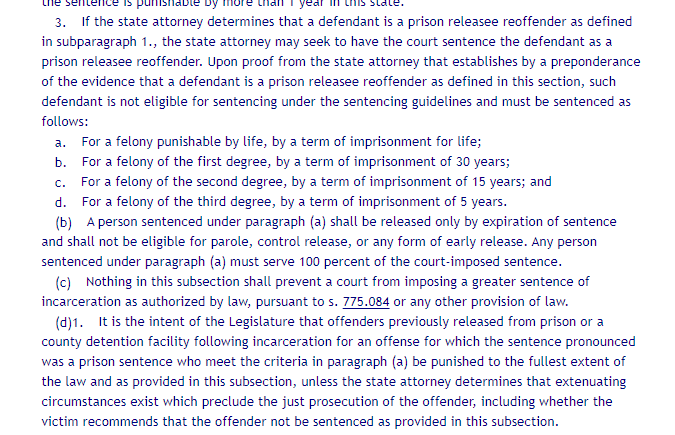
➡Read more about Florida's Two-Strike Law:
Why Florida has the most people serving life without parole | The Marshall Project
Prosecutors Use Florida’s Two-Strikes Law Against Black Men | The Marshall Project
‘Two Strikes’ and ‘Tutwiler’ from The Marshall Project and FRONTLINE Reveal Life Behind Bars | The Marshall Project
The lack of transparency from lawmakers regarding the full implications of House Bill 1181 and Senate Bill 1274 is troubling. 🚩
Given Florida's direct file statute, the potential consequences of these bills could be severe, particularly regarding the contraband issue. It raises concerns that these critical details are not being adequately communicated to other lawmakers and the public. The introduction and support of this bill, along with the broader issues plaguing our criminal justice system, highlights a dire need for intervention and raises serious questions about the objectives of our lawmakers and prosecutors.
Lawmakers have a duty to ensure that legislation is crafted and discussed transparently, with a full understanding of its potential impact. We must hold our elected officials accountable for the laws they propose and pass, ensuring they serve the best interests of all constituents, especially our vulnerable youth.

This isn't just about law and order; it's about the kind of society we want to build.
- Are you aware that the prison system offers minimal rehabilitation?
- Do you realize that children have been locked away for two-three-and four decades for being mere bystanders in non-homicide crimes, often longer than other states punish more heinous crimes?
- Are you aware of the thousands of individuals incarcerated with life sentences in the state of Florida for non-homicide crimes?
- Are we aware it's considered
“grand theft” and a felony of the 3rd degree, punishable by 5 years in prison, for stealing a bike valued at $101 from someone's house?
Who are you voting for? 🤔
These harsh realities underscore the urgent need for a thorough reevaluation of who we elect to office. 🚨
Florida's laws, with their draconian nature, demand legislators who are committed to genuine reform, rather than perpetuating a crisis by funneling more funding into an already strained system. It is imperative that voters take a hard look at candidates' stances on criminal justice and choose those who will prioritize addressing these critical issues. This current circus in Florida, a direct result of our electoral choices, underscores the urgent need to scrutinize who we elect to office. It's time for the public to look beyond televised promises, many of which diverge significantly from factual correctness.
Investigate their voting history on critical topics, be informed, and make educated decisions.
Don't just pick a name from a hat. The stakes are high, as demonstrated by the potential for youth to face 15 years in prison for minor infractions like possessing phones and coins. Our collective future hinges on our ability to elect officials who truly represent our values and the justice we seek for all, especially our youth. Only then can we hope to see a shift towards a more just and equitable legal system, one that truly serves the interests of all Floridians.
Florida in a nutshell:
✅Increase penalties and send more people to prison.
✅Overpopulated, understaffed prisons in a state of crisis.
❌Address underlying issues like poverty, mental health, substance abuse, trauma, etc.
❌Correct inequitable laws.
It's clear that the current path is unsustainable and unjust.
Wake up, wake up, it's the first of the month... 🎶
No, seriously, let's wake up and take action. 📞
It's critical for Floridians to voice their opposition to these drastic measures targeting our youth. This issue may not directly affect you today, leading you to scroll past and forget. But remember, by the time it does impact you or someone you love, it could be too late to act.
Don't be indifferent. Contact your lawmakers now, express your stance against imposing such severe penalties on our youth for minor infractions. Your involvement can make a difference in shaping a fairer, more just future for all.
Act before it's too late—don't be the person who only realizes the importance of these issues when they're personally affected.
⬇Find your lawmakers here:⬇
🗣 Hey A&E, Florida needs an intervention down here. Let's chat. 📞
Follow Us
Leave us a comment.
Voices of the Silenced:

"I would love to help with this cause anyway I can. I have met some good guys behind these walls, many like me that have spent their childhood and most of their adulthood behind these walls."
-Kenneth Burden
"I accepted a plea deal for a 40 year cap believing I was going to get a youthful offender sentence. I guess you know that didn't turn out as planned. At 17 years old, I was sentenced to thirty years in prison for each of my crimes followed by ten years of probation. I couldn't even comprehend that. Hell, I hadn't even been alive but for 17 years, how could I imagine spending the next thirty years of my life in prison?"
-Philip Mosier
"I've been saying for the longest , the only way to make a difference is to make such a loud noise the world can't help but listen."
-Jessy Burrows
"I wouldn't wish this journey on my worst enemy and its sad to say this place only makes you one of two ways: better or worse and with the odds stack against you. People tend to become worse because there's no type of rehabilitation in here."
Write your caption here-Deon Gilchrist
"I was sixteen the day I got arrested, not knowing nothing but thinking I knew it all. It's sad because when you live you learn (we all make mistakes) but giving teenager's double + the years they are in age doesn't allow any progress looking further in the future. "
Write your caption here-Rachaun Blount
"I am the 8th. I stand as living proof that the system can and must evolve to provide fair and proportionate justice for all."
Write your caption here– Terrence Graham, Co-founder, PleadThe8th
“It's unfair that I'm still getting punished for something that happened 20 years ago. I'm a changed man, I don't get disciplinary reports and I stay out of trouble. I'm just ready to get out and let everyone see the new me. I was 17, now I'm 37.”
Write your caption here– John Mosley
" I PRAY AND HOPE WE DO FIND A BREAKTHROUGH AND CHANGE THE LAW. I ALSO UNDERSTAND THAT THIS WON'T BE AN EASY BATTLE WE ARE FIGHTING AN LONG AND UP HILL BATTLE AND HOPE THAT WE HAVE WHAT IT TAKES TO MAKE A DIFFERENCE!"
Write your caption here-JATAVISH HARRIELL
"I have been in prison since I was 17 years old. I've been locked up for 10 years on a 45 year sentence. This applies to me. I hope you guys can get us some relief. Please keep me updated on what progress you guys make, please and thank you."
Write your caption here-Devin Rivera
"I have been in prison since I was sixteen and believe me, I know that things need to change, because people change. After all, that's what make us human."
Write your caption here-Allen Bythwood
"I am one of the many youthful offenders incarcerated in the prison system. I am interested in doing anything I can possibly do to help the movement in the strive towards justice for our youth. I thank you for everything you are doing. It's a blessing to have people finally being a voice for the ones who were silenced by the system for so long. Again, thank you."
Write your caption here-Juny Abraham
"I was 17 years old when I came into the system. I don't have no murder and no one got physically hurt in my case. I ended up with 40 years with 30 of that mandatory. I was 17 at the time of the robberies. As of now, I've been in prison longer than I was living before I came to prison. I'm hoping you can help with this law getting changed. I was railroaded and surely did not deserve so long."
Write your caption here-Ronnie Ricks
"I am incarcerated for 2 counts of armed robbery that I didn't commit, even the victim stated that the female involved was a white female. I am an African American woman. I need all the help there is to be able to get my sentence of 27.5 years overturned. I would greatly appreciate it if this movement gets going. I have already served 14 years in jail and prison altogether and I'm ready to serve my community as I go back out into society and give myself another chance. Thank you for contacting me, I really am grateful."
Write your caption here-Geneva Kellum
"Mothers and fathers have been grieving of the loss of their kids for years holding on to faith and prayers which they depend on to live with their hurt. I am now 31 years old and have been incarcerated since the age of 17. I am overwhelmed with pain from this incarceration, overwhelmed with the loss of family members, most recent loss was my father. It seems like only a few people in my family actually know I exist. I used to be mad and disappointed when I see people in America on tv and especially soical media it constantly reminded me how forgotten and overlooked this situation was. Then i realize it's not that the people didn't care, they simply didn't know, WE WERE OVERLOOKED, I was one of the juveniles sentence to life in prison and didn't kill anyone, then resentence to 50 years, sentence to the same amount or more time than an adult who did commit murder, sentence by an corrupt system. After doing over 11 years in prison, I was fortunate enough to be resentence recently leaving me with less then 8 years."
Write your caption here-Daryl Thomas
Check out our other blogs!
Kids in Prison: Voices of the Silenced. #PleadThe8th
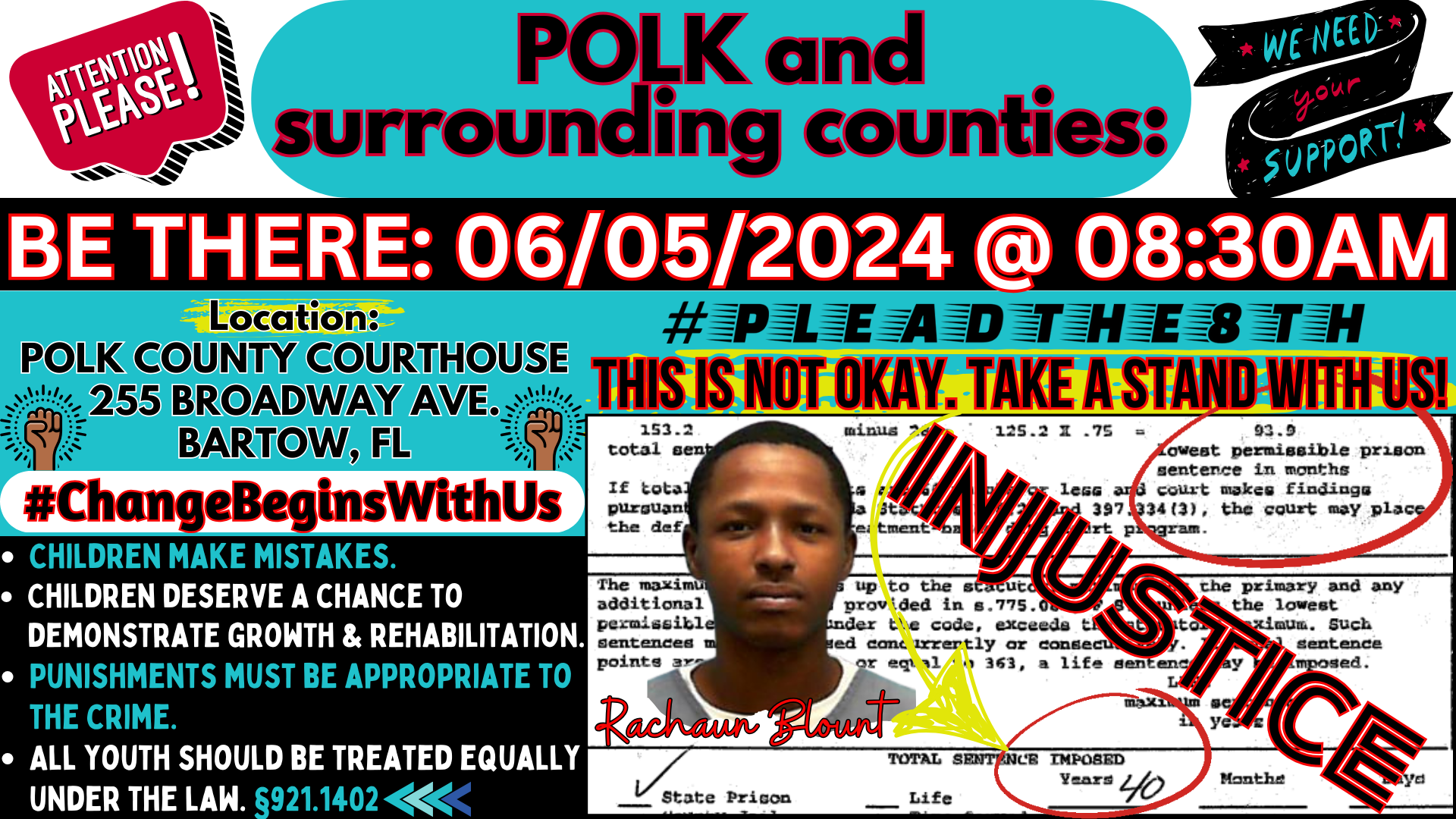
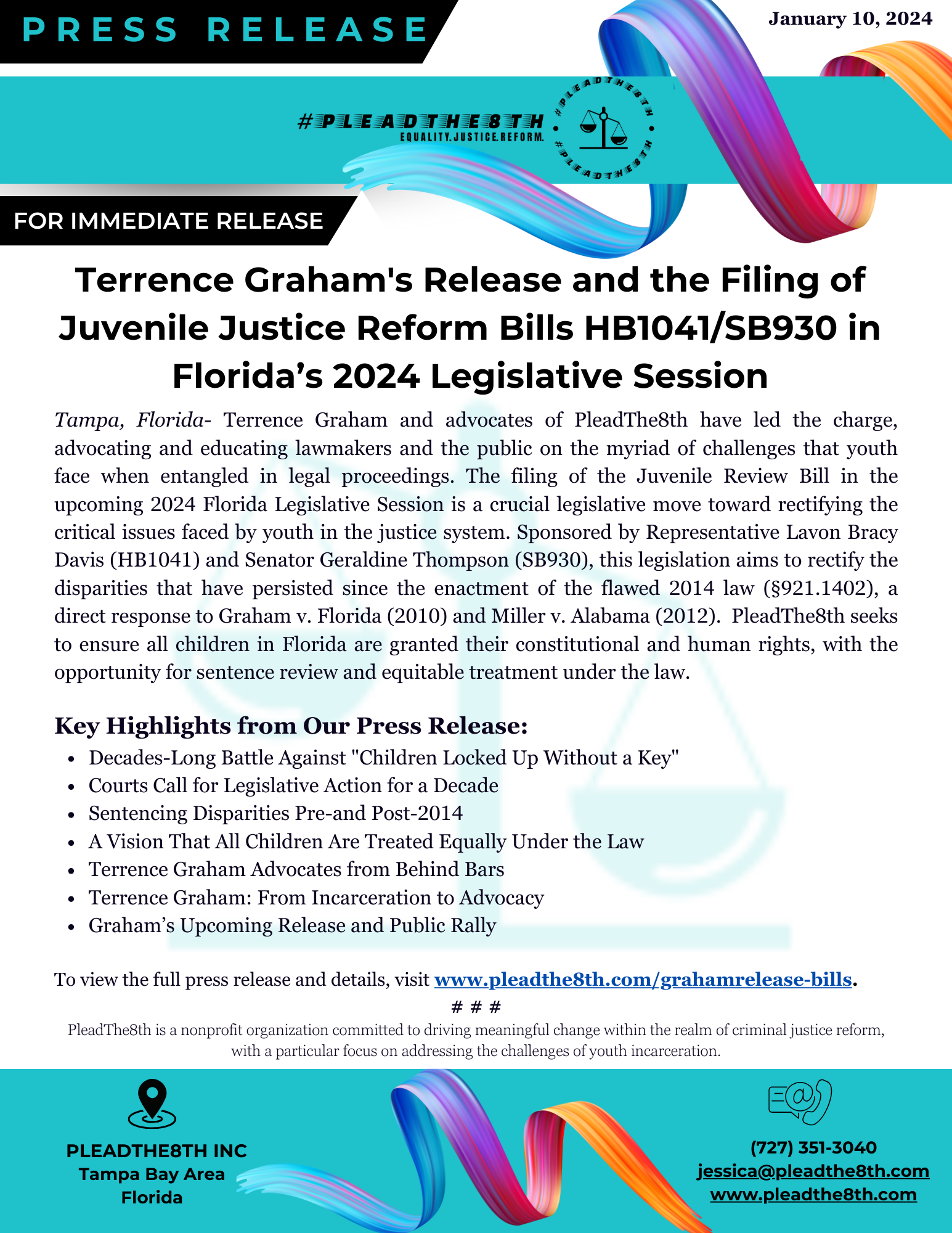
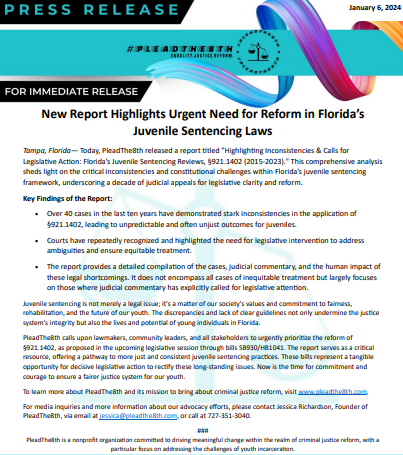
Your Support Matters
A gift today helps us fight for kids without a voice.
PleadThe8th
is a qualified 501(c)(3) tax-exempt organization and donations are tax-deductible to the full extent allowed under the law.
Follow us on Social Media!
Tweet & Share to remind those in power that we demand justice and equality.
